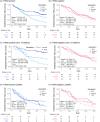Significance of micro-EGFR T790M mutations on EGFR-tyrosine kinase inhibitor efficacy in non-small cell lung cancer
- PMID: 37957228
- PMCID: PMC10643699
- DOI: 10.1038/s41598-023-45337-3
Significance of micro-EGFR T790M mutations on EGFR-tyrosine kinase inhibitor efficacy in non-small cell lung cancer
Abstract
Small amounts of epidermal growth factor receptor (EGFR) T790M mutation (micro-T790M), which is detected using droplet digital PCR (ddPCR) but not conventional PCR, in formalin-fixed and paraffin-embedded (FFPE) samples have been investigated as a predictive factor for the efficacy of EGFR-tyrosine kinase inhibitors (TKIs). However, the predictive value of micro-T790M remains controversial, possibly owing to the failure to examine artificial T790M in FFPE specimens. Therefore, we examined the predictive value of micro-T790M in first-generation (1G), second-generation (2G), and third-generation (3G) EGFR-TKI efficacy using a new method to exclude FFPE-derived artificial mutations in our retrospective cohort. The primary objective was time to treatment failure (TTF) of 1G, 2G, and 3G EGFR-TKIs according to micro-T790M status. In total, 315 patients with EGFR-positive non-small cell lung cancer treated with 1G, 2G, and 3G EGFR-TKIs were included in this study. The proportion of patients positive for micro-T790M in the 1G, 2G, and 3G EGFR-TKI groups was 48.2%, 47.1%, and 47.6%, respectively. In the micro-T790M-positive group, the TTF was significantly longer in the 2G and 3G EGFR-TKI groups than in the 1G TKI group. No differences in the micro-T790M-negative group were observed. Micro-T790M status detected using ddPCR, eliminating false positives, may be a valuable predictor of EGFR-TKI efficacy.
© 2023. The Author(s).
Conflict of interest statement
Satoru Miura reports personal fees from Chugai Pharmaceutical Co., Ltd.; AstraZeneca K.K; Ono Pharmaceutical Co., Ltd.; Bristol-Myers Squibb; and Takeda Pharmaceutical Co., Ltd. outside the submitted work. Motoko Tachihara reports grants from Chugai Pharmaceutical Co., Ltd. and AstraZeneca K.K. outside the submitted work, in addition to personal fees from Eli Lilly Japan K.K. and Chugai Pharmaceutical Co., Ltd. outside the submitted work. Akihiro Bessho reports grants from Ono Pharmaceutical Co., Ltd.; AstraZeneca K.K.; Pfizer; Chugai Pharmaceutical Co., Ltd.; MSD K.K.; and AbbVie G.K. outside the submitted work. Chiyoe Kitagawa reports grants from Daiichi Sankyo; Sanofi K.K.; Merck Biopharma Co.; and the Public Health Research Foundation outside the submitted work. Junko Tanizaki reports personal fees from AstraZeneca K.K. and Chugai Pharmaceutical Co., Ltd. outside the submitted work. Koji Haratani reports grants from AstraZeneca K.K. Takumi Imai reports lecture fees from Kyowa Kirin Co., Ltd. outside the submitted work. Nobuyuki Yamamoto reports personal fees from MSD K.K.; AstraZeneca K.K.; Amgen Inc.; Ono Pharmaceutical Co., Ltd.; Otsuka Pharmaceutical Co., Ltd.; Guardant Health Japan Corp.; Tumura; Kyowa-Kirin Co., Ltd.; Kyorin Pharmaceutical Co., Ltd.; GlaxoSmithKline; Sanofi K.K.; Daiichi-Sankyo Co., Ltd.; Taiho Pharmaceutical Co., Ltd.; Takeda Pharmaceutical Co., Ltd.; Chugai Pharmaceutical Co., Ltd.; Eli Lilly Japan K.K.; Nippon Kayaku Co., Ltd.; Boehringer-Ingelheim Co., Ltd.; Novartis; Pfizer Japan Inc.; Bristol Myers Squibb; Miyarisan Pharmaceutical Co., Ltd.; Merck Biopharma Co.; and Janssen Pharmaceutical K.K. outside the submitted work, in addition to grants from Boehringer-Ingelheim Co., Ltd.; Taiho Pharmaceutical Co., Ltd.; Chugai Pharmaceutical Co., Ltd.; Shionogi & Co., Ltd.; Eli Lilly Japan K.K.; Daiichi-Sankyo Co., Ltd.; Tumura & Co.; Nippon Kayaku Co., Ltd.; Asahikasei Pharma Corporation; AstraZeneca K.K.; Janssen Pharmaceutical K.K.; Sanofi K.K.; Amgen Inc.; Novartis; Astellas Pharma Inc.; MSD K.K.; Eisai Co., Ltd.; Bristol Myers Squibb; AbbVie G.K; and Tosoh outside the submitted work. Kazuhiko Nakagawa reports personal fees from Eli Lilly Japan K.K.; Chugai Pharmaceutical Co., Ltd.; Ono Pharmaceutical Co., Ltd.; Pfizer Japan Inc.; and Merck Biopharma Co., Ltd. outside the submitted work, in addition to grants from MSD K.K.; Daiichi Sankyo Co., Ltd.; Taiho Pharmaceutical Co., Ltd.; Chugai Pharmaceutical Co., Ltd.; Syneos Health Clinical K.K.; Japan Clinical Research Operations; AstraZeneca K.K.; IQVIA Services JAPAN K.K.; Covance Japan Inc.; Takeda Pharmaceutical Co., Ltd.; GlaxoSmithKline K.K.; Sanofi K.K.; EPS Corporation; Novartis Pharma K.K.; Medical Research Support; Bristol Myers Squibb Company; PRA Health Sciences Inc.; Janssen Pharmaceutical K.K.; Eisai. Inc.; Parexel International Corp.; Ono Pharmaceutical Co., Ltd.; PPD-SNBL K.K; Nippon Boehringer Ingelheim Co., Ltd.; Sysmex Corporation; and Eisai Co., Ltd. outside the submitted work, in addition to scholarship endowments from Takeda Pharmaceutical Co., Ltd.; Chugai Pharmaceutical Co., Ltd.; Ono Pharmaceutical Co., Ltd.; and Eisai Co., Ltd. outside the submitted work; he has a patent with Daiichi Sankyo Co., Ltd. outside the submitted work. Noboru Hattori reports personal fees from AstraZeneca K.K. and Boehringer-Ingelheim Japan Inc. outside submitted work and grants from Eli Lilly Japan K.K. and Taiho Pharmaceutical Co., Ltd. outside submitted work. No other disclosures are reported.
Figures



References
-
- NCC Network. NCCN Clinical Practice Guidelines in Oncology (NCCN Guidelines®) Non-Small Cell Lung Cancer Version 3.2023. https://www.nccn.org/professionals/physician_gls/pdf/nscl.pdf (2023).
Publication types
MeSH terms
Substances
LinkOut - more resources
Full Text Sources
Medical
Research Materials
Miscellaneous

